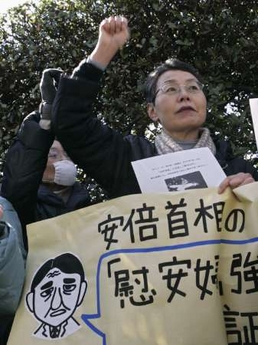Asia-Pacific
Japan to probe WWII military brothels
(AP)
Updated: 2007-03-09 06:43
 |
Large Medium Small |
Abe triggered outrage in China, North and South Korea and the Philippines last week by saying there was no proof the women were coerced. He said Monday that Japan will not apologize again for the Japanese military's "comfort stations."
Abe also faces pressure from the United States, where the House of Representatives is considering a resolution urging Japan to formally apologize for its wartime brothels. Japanese leaders apologized in 1993 for the government's role, but the apology was not approved by Parliament. Abe said Thursday that he "basically stands by the 1993 apology."
The government is ready to cooperate with the investigation, Abe said Thursday, amid calls for a review from conservatives who question many of the claims by victims and others who say the government kidnapped the women and forced them into sex slavery.
"I was told the party will conduct an investigation or a study, so we will provide government documents and cooperate as necessary," Abe told reporters.
The top government spokesman said earlier Thursday that Japan's position on the coercion of women into sex slavery during the war had been misinterpreted and misrepresented by the U.S. media, and that Tokyo would soon issue a rebuttal.
Demonstrators hold banners at a rally to protest Japanese Prime Minister Shinzo Abe's remarks on 'comfort woman'--Japan's euphemism for wartime sex slaves-- near the parliament in Tokyo March 7, 2007. The protestors are holding banners calling on Japan to acknowledge that comfort women were coerced into serving in Japanese military brothels. [Reuters] |
Historians say that about 200,000 women — mostly from Korea and China — served in Japanese military brothels throughout Asia in the 1930s and 1940s. Accounts of abuse by the military have been backed up by witnesses, and even former Japanese soldiers.
Abe's statement contradicted evidence in Japanese documents, unearthed in 1992, that historians said showed that military authorities had a direct role in working with contractors to forcibly procure women for the brothels.
But prominent Japanese scholars and politicians routinely deny direct military involvement or the use of force in rounding up the women, blaming private contractors for the abuses.
The fallout from the remarks continued to build Thursday.
The coercion of women into prostitution was "one of the key, serious crimes committed by Japanese imperial soldiers," Qin Gang, a Chinese Foreign Ministry spokesman said during a regular news briefing.
"We hope that Japan can show courage, take a responsible attitude toward history," he said.
| 分享按鈕 |
